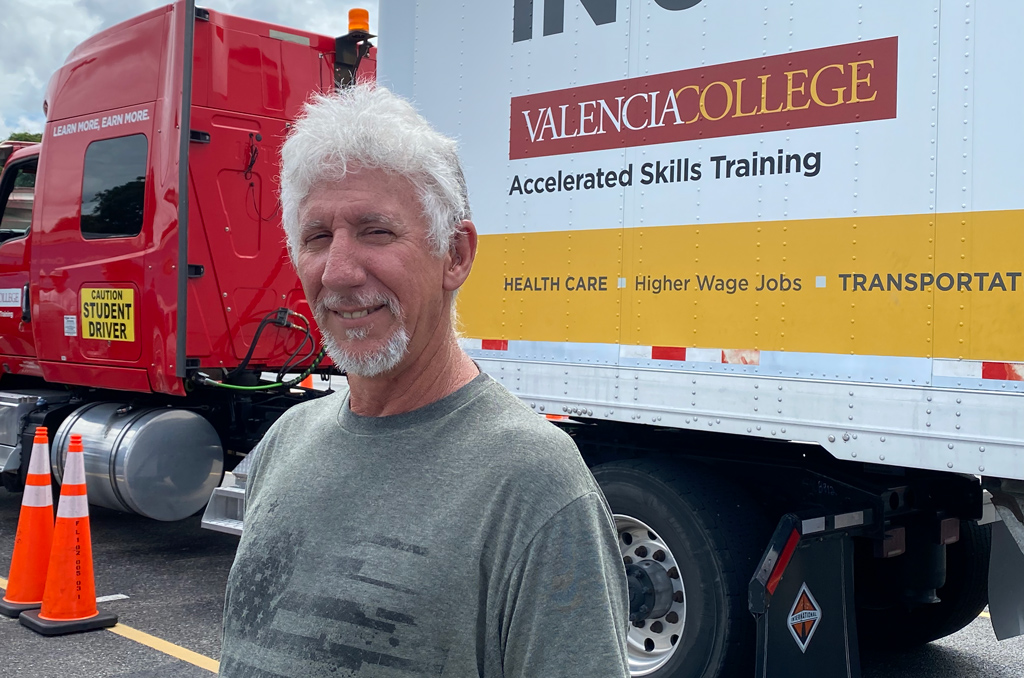Driving a big rig was an idea Stuart Randles had always toyed with, a dream that had been percolating in his head since middle school.
“It’s the only life goal I had – a bucket list item,” he says.
Yet for Stuart, driving a tractor trailer seemed like a goal that might be unattainable. He is deaf, and as an adult, he worked a variety of jobs to get by – landscaping, construction, merchandising in large department stores. For several years, the closest he got to his dream was driving a small delivery truck for an outdoor furniture company.
But one night while scrolling on Facebook, Stuart noticed a post by a group called Deaf Truckers United. The group gives tips on how deaf people can get a hearing waiver from the FMCSA (Federal Motor Carrier Safety Administration) to earn a commercial driver’s license (CDL) and become successful truckers.
Intrigued, Stuart began doing research online – and discovered that maybe his dream was within reach.
While the concept of a deaf trucker may surprise many Americans, deaf people won the right to drive commercial vehicles in 2013, when the U.S. Department of Transportation announced it was rolling back prohibitions that kept deaf or hard of hearing people from driving trucks for decades. In Florida, however, the state had no certified way for a deaf person to take a CDL exam – until a deaf Jacksonville woman who wanted to become a long-haul trucker with her truck-driving husband challenged the state.
Still, five years after that, there are more hurdles for deaf people than hearing people.
Stuart had to apply for a hearing waiver from the federal government and get his other paperwork approved. Altogether, it took more than six months to get the paperwork he needed to sign up for Valencia College’s four-week-long CDL class.
Launched in 2019 as part of Valencia’s Accelerated Skills Training program, the college’s CDL program graduated 130 new truck drivers in its first year. Last year, 265 students graduated from the program – and there’s a waiting list to get into the fast-growing program, which is taught at Valencia’s West Campus on Kirkman Road in Orlando, as well as at Valencia’s Osceola Campus in Kissimmee.
Although the staff had plenty of experience with hearing students, Valencia’s team jumped into action to make sure Stuart could succeed in the course. Although Stuart can read lips, the team enlisted sign language interpreters from the college’s Office of Student Disabilities to help Stuart understand what the instructors were saying. “We had two interpreters here every day for eight hours,” said Mark Hughes, director of the AST programs for construction, truck driving and powerline technician programs.
After four weeks of classes, which consists of both classroom and practice driving trucks, Stuart passed his three-part exam – which was conducted in the presence of a certified examiner from the state Department of Highway Safety and Motor Vehicles.
Only five deaf residents have tried to earn a CDL in Florida in the past five years, but all five have passed, said Tod Browning of the state’s Highway Safety and Motor Vehicle agency. “We are definitely accommodating, but we haven’t had a big push for people trying to do this. There are a few (deaf drivers) out there and that’s kind of the way it’s been nationwide, too,” Browning said. “Certainly, what we’ve seen is these drivers have the ability to drive, I do have a few concerns because they can’t hear air leaks or horns. But, what we have seen in the people we have tested is they train very well, they’re well prepared. Everyone that we’ve tested so far has eventually passed this test.”
Hughes understands the needs of deaf or hard-of-hearing students because his sister is deaf. And he’s pleased that Stuart has helped pave the way for other deaf students to earn their CDL licenses at Valencia College.
“Because of Stuart, we went through the paperwork and got certified as a testing site for other deaf students to do their CDL testing here,” Hughes said. “Now, students from all over the state can conduct their state tests here – instead of driving to Tallahassee to take the test. That’s great news for people from South Florida, who used to have to go all the way to Tallahassee for the test.”
Stuart, too, is happy to be a leader and an advocate for other deaf people who want to become truckers. “You just have to have confidence in yourself and don’t be afraid,” he says.
What’s next for Stuart? Sorting through job offers, so he can chase his dream – and become a long-haul trucker and see the country.
Adds Hughes: “Most of the major trucking companies come here and offer jobs to all of our students, so they have plenty of options when they graduate.”
